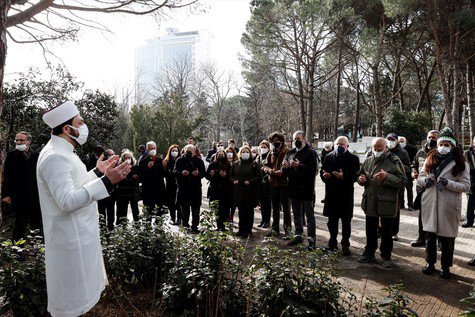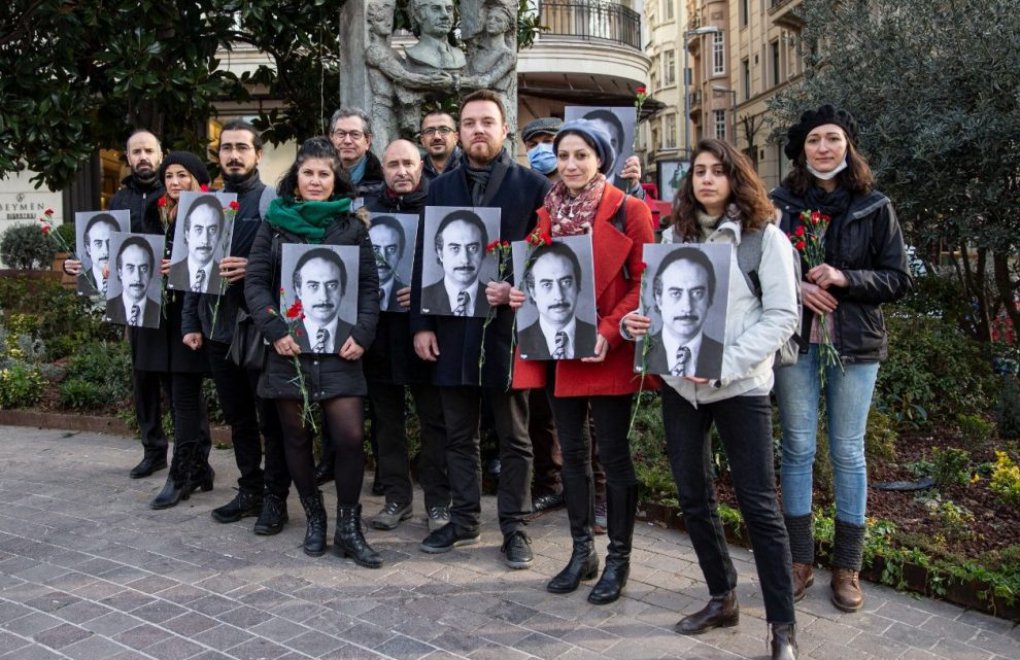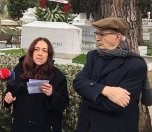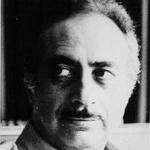* Photo: TGS
Click to read the article in Turkish
It has been 43 years since journalist Abdi İpekçi, the then editor-in-chief and lead columnist of daily Milliyet, was killed in an armed attack.
On the 43rd anniversary of his death, Abdi İpekçi was commemorated in the place where he was killed and at his grave in İstanbul.
The Journalists' Union of Turkey (TGS), which was also chaired by Abdi İpekçi himself, commemorated the late journalist in the place where he was shot to death while the Turkish Journalists' Association (TGC) and the Press Council were at his grave for the commemoration.
Holding a ceremony at the memorial in front of İpekçi's house in İstanbul's Nişantaşı, the TGS made a brief press statement there. TGS Secretary General Mustafa Kuleli gave information about İpekçi's life while TGS Chair Gökhan Durmuş put a special emphasis on İpekçi as a laborer, especially within the context of his efforts and struggle to organize journalists to have the Press Labor Law no. 212 enacted in Turkey in 1961.
"He stood up against the attitude of the capital's newspapers that were preventing people's right to obtain information," said Durmuş.

* Photo: AA
The commemoration ceremony held at Abdi İpekçi's grave in İstanbul Zincirlikuyu Cemetery was attended by his daughter Nükhet İpekçi İzet, former İstanbul Bar Association Chair Turgut Kazan, Press Council Chair Pınar Türenç, TGC Secretary General Sibel Güneş, Hürriyet Newspaper columnist Sedat Ergin, Milliyet Newspaper Editor-in-Chief Mete Belovacıklı, Milliyet columnist Tunca Bengin and main opposition Republican People's Party (CHP) İstanbul Provincial Organization Vice Chair Saniye Yurdakul as well as several journalists and media employees.
Speaking at the ceremony, İpekçi's daughter Nükhet İpekçi İzet said, "My father's presence at Milliyet Newspaper had not even lasted for 30 years, but Milliyet Newspaper has kept him alive for 43 more years."
TGS Secretary General Sibel Güneş also briefly said:
"The most important things underlined by Abdi İpekçi in his articles were the indivisible integrity of this country, democracy and peace. It was also one of his most significant features that he never compromised on journalism. We still need Abdi İpekçi journalism so much.
"We always remember him with love and longing. There is a dire need for a class on how Abdi İpekçi murder was committed and on the trial over Abdi İpekçi murder at both faculties of communication and law.
"If we had been able to explain the mentality that committed the Abdi İpekçi murder, there would have been neither the unidentified murders, nor physical attacks, murders and impunity as a reward for journalists' murders in the next period. We will come here every February 1 and we will keep asking why Abdi İpekçi was murdered. And to the ones who say that Abdi İpekçi journalism is over, we will say that it is not over and this country will see a brighter future only if we can practice our profession with an understanding based on Abdi İpekçi journalism." (HA/SD)






